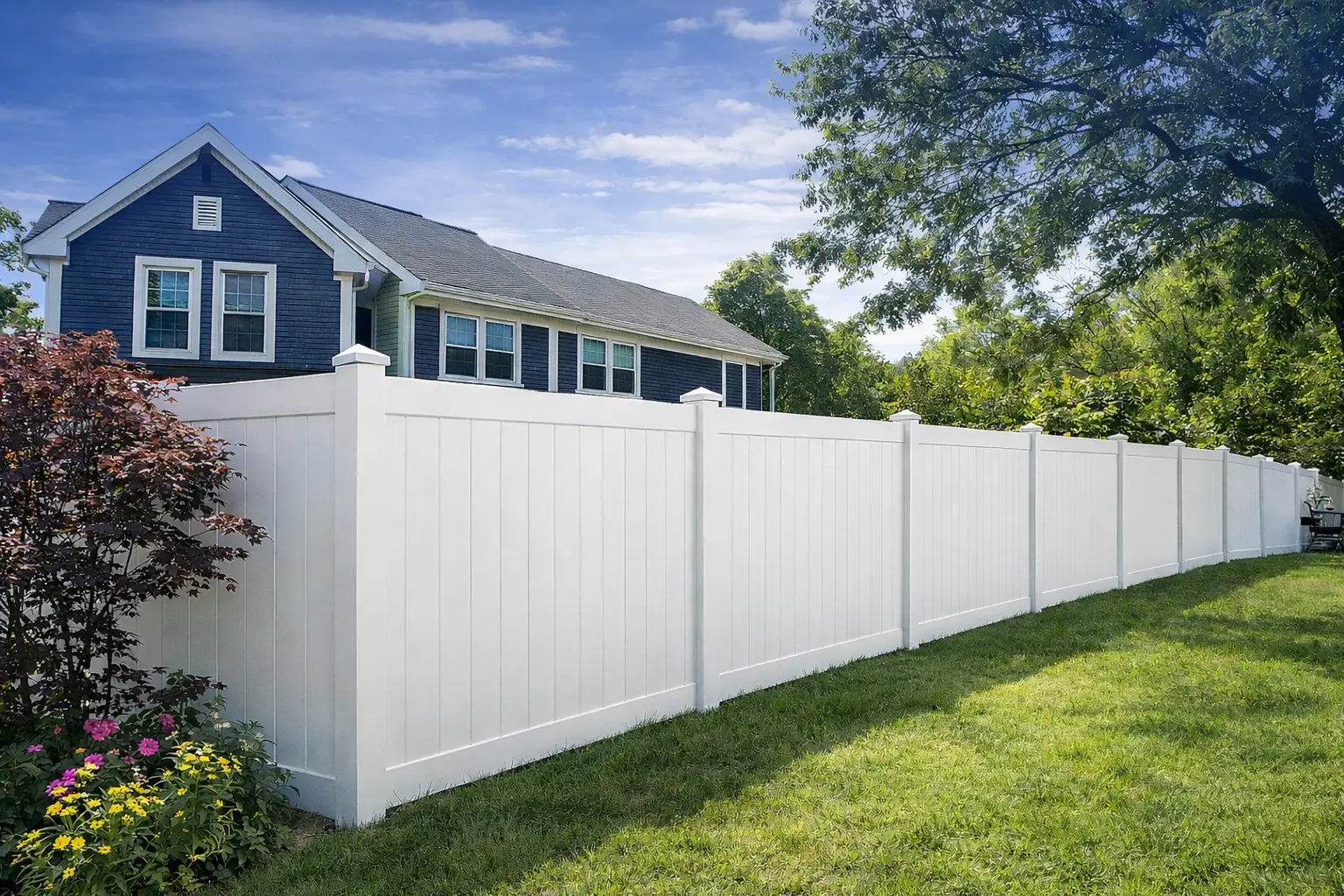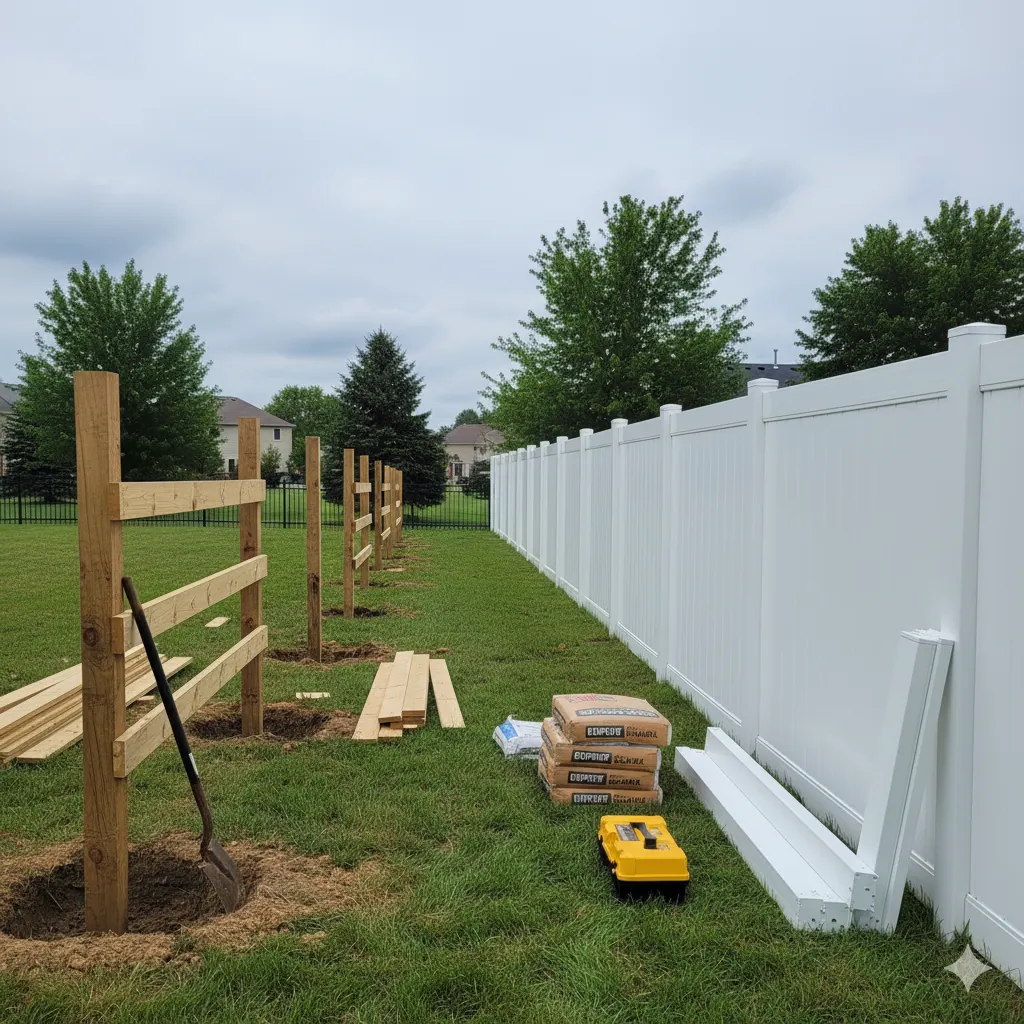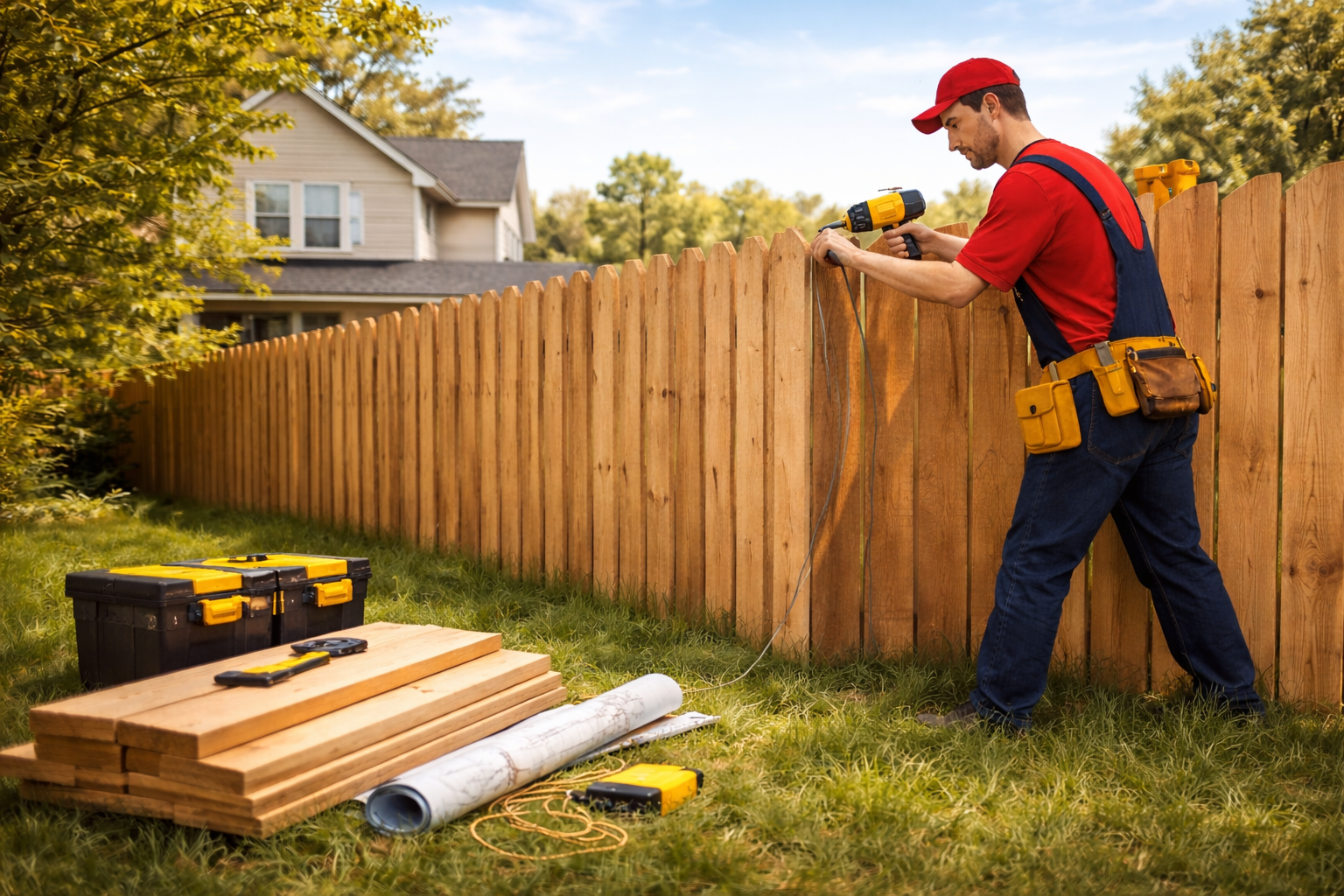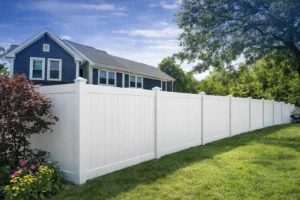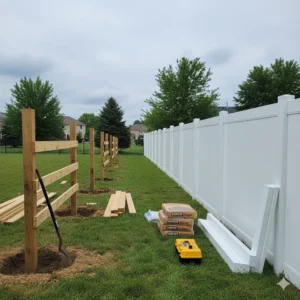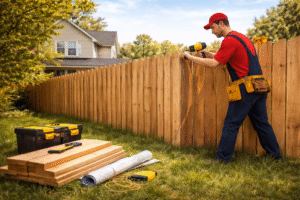Are you a Buffalo homeowner looking for a fencing project to be done? Then don’t skip. This article is just right for you!!
You may be wondering, ‘How long does a fence last?’ before replacing an old one or investing in a new one. After all, Buffalo residents may have experienced firsthand how harsh winter can be.
The durability of various fence materials, how climate impacts their lifespan, and fencing maintenance to extend the lifespan of your fence are all covered in this article.
Let’s learn how to plan your upcoming fencing job confidently.
Why Fence Lifespan Matters
Rather than being a short-term property improvement, a fence is a long-term investment in your house or business. In addition to defining boundaries and offering seclusion, a high-quality wall enhances curb appeal, promotes security, and increases your home’s value.
Buffalo’s harsh winters, heavy snowfall, and frequent temperature changes can all cause damage to fences. As a result, when planning your project, you should first understand how long specific fence materials typically last.
Certain materials are designed to last for a long period with minimal maintenance, while others may require regular upkeep to keep their attractive appearance.
Knowing the lifespan of your fencing will help you determine your budget and achieve your long-term goal of protecting your fence.
Understanding fencing maintenance is more than simply avoiding unexpected expenditures; it’s also about taking proactive efforts to keep your property secure and appealing.
Safeguard your investment and maintain your peace of mind by preparing ahead of time and staying up to date with regular maintenance.
Several important aspects affect how long a fence lasts:
- How far will your fence have to extend into harsh weather conditions
- Maintenance methods, quality
- Type of material
- Quality of the installation
This knowledge will guide you to make careful and informed judgments about your fence requirements.
Buffalo’s climate features heavy snowfall in winter, as well as high temperatures in summer and significant fluctuations in humidity throughout the year. Which ultimately results in a reduced lifespan of your fence if proper materials and maintenance are not used.
Fence Lifespan Chart by Material
Here’s a fence lifespan chart to help you quickly compare materials:
| Fence Material | Average Lifespan | Climate Impact | Maintenance Level |
|---|---|---|---|
| Wood | 10-20 years | Treated wood is comparatively more resistant to climatic conditions than untreated wood. | High |
| Chain Link | 15-25 years | Galvanized versions resist climatic impacts like high snow | Moderate |
| Vinyl | 20-30 years | Resistant to snow and moisture | Low |
| Composite | 25-30 years | Resists rot, ideal for tough climates | Low to Moderate |
| Aluminum | 30+ years | Doesn't rust, holds up in Buffalo winters | Low |
| Wrought Iron | 20-25 years (with care) | Prone to rust without regular maintenance | High |
Wood Fence
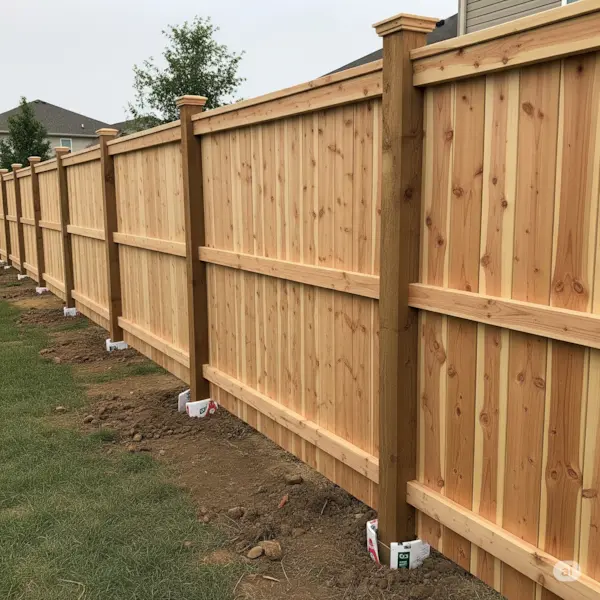
A wood fence offers classic aesthetic appeal, particularly with cedar or redwood. However, the lifespan of the wood fence depends on the owner’s maintenance. Here in Buffalo, untreated or neglected wood fences only last for ten to fifteen years before warping, rotting, or splitting.
If you want to make your wood fence last longer:
- Use pressure-treated lumber.
- Oil or stain every 2-3 years.
- There should be no ground contact with horizontal rails.
- The wet winters Buffalo experiences can hasten wood rot.
Vinyl Durability: A Smart Option.
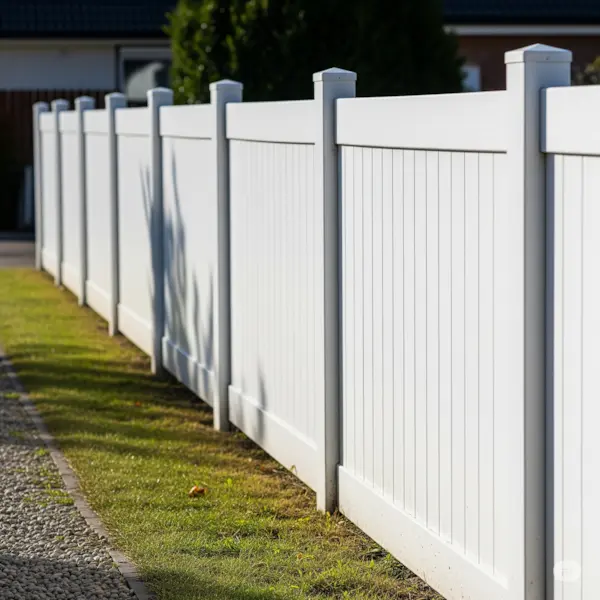
Few materials can match vinyl’s durability. Vinyl fences are very resistant to dampness, snow, and Buffalo’s shifting temperatures. They do not decay, fracture, or need to be repainted as frequently as wood does.
How long do vinyl fences last? With simple fencing maintenance, you can anticipate 20 to 30 years of service. It’s also one of the most popular alternatives to privacy fences in our region due to its sturdy construction and sophisticated appearance.
Looking for additional information? See our guide to the Best Fences for Snow in Buffalo.
Chain Link and Galvanized Fence Panels
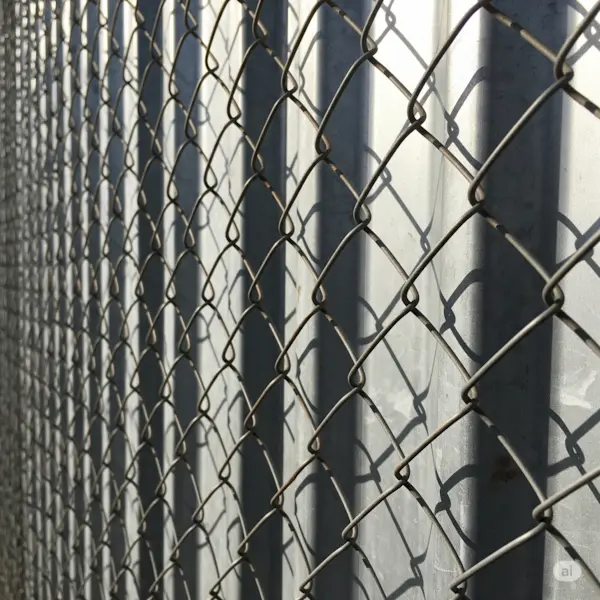
Chain link and galvanized fence panels are durable options for residential and commercial buildings, especially in Buffalo’s harsh winters. Modern galvanized fence panels are zinc-coated, making them extremely resistant to weathering and corrosion, especially in harsh winter conditions.
With adequate care, you may expect to live 15 to 25 years. DIY chain link fence kits might save money upfront, but they may not be as strong as a professionally put fence.
Need assistance with installation? Discover all of our DIY fence options, or reach out to us for professional help.
Aluminum fences: Long life and low maintenance.
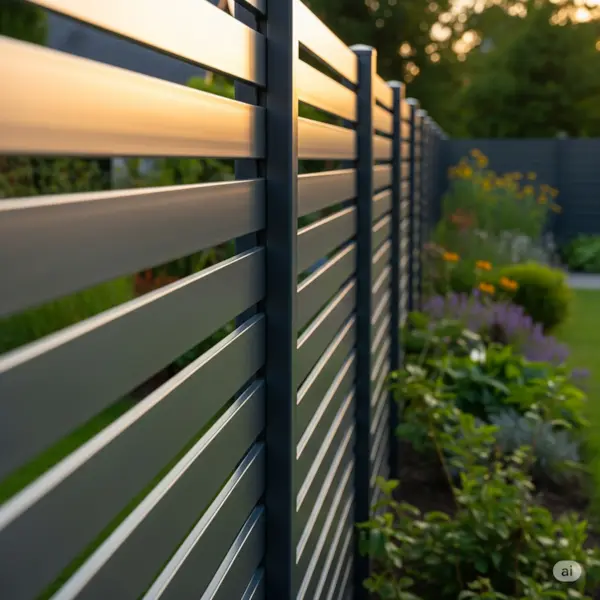
Aluminium fencing is a popular choice among Buffalo homeowners who want flair without the hassle of continual maintenance. Unlike iron, aluminum does not rust. Even with Buffalo’s icy, salty roads, metal retains its beauty with little effort.
Expect a lifespan of 30 years or more, which makes it one of the most durable fence materials available. Furthermore, it is great for ornamental fences around gardens, pools, and front yards.
Composite fences are modern and durable.
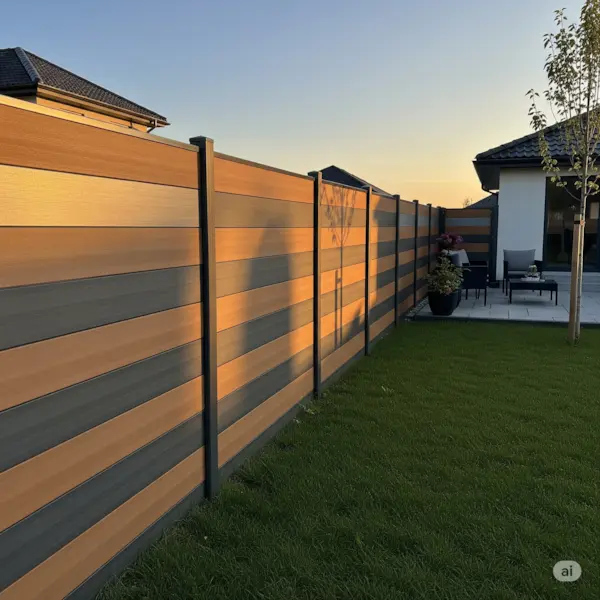
Composite fences combine recycled wood fibers with long-lasting plastic, making them ideal for moisture-prone areas such as Buffalo. These fences will not decay or warp like genuine wood and typically come with warranties of 20 to 30 years.
While the initial expenditures are greater, composite fencing’s minimal maintenance and contemporary design make it a growing trend in New York.
Fencing Maintenance Tips to Extend the Lifespan
Fencing upkeep, regardless of the material used, has a significant impact on the extent to which your fence will endure. Here are a few easy steps to follow:
- Annual cleaning is recommended to eliminate dirt and mold.
- Inspect routinely for damage caused by severe snowfalls or storms.
- Apply stain or sealer to wood fences.
- Repairs should be completed as soon as possible to prevent minor concerns from becoming severe difficulties.
For more thorough guidance, see our entire guide on Fence Maintenance in Buffalo, NY.
When to replace a wall or fence?
In any case, should you replace your wall or fence? Look for these signs:
- Leaning or sagging portions
- Corrosion or rust beyond repair.
- Missing boards or panels.
- Increased maintenance expenditures.
If maintenance is becoming more regular and expensive, replace your fence with one designed for Buffalo’s changing climate.
Choosing the Ideal Fence for Buffalo's Climate
In Buffalo, New York, experts advise concentrating on materials that resist dampness, withstand snow, and need less maintenance. Vinyl, metal fencing such as steel or aluminum, and galvanized chain link fencing are popular options for durability in the area.
If you decide to partner with All Pro Fence Buffalo, we’ll help you select the best materials and style for your house, budget, and maintenance needs.
Buffalo Climate, Weather By Month, Average Temperature (New York, United States)
Why Select All Pro Fence Buffalo?
Local operated and functioning: We are aware of Buffalo’s weather issues.
A diverse choice of materials spans private fences to commercial fences.
Professional installation: Better installation leads to a longer fence life.
Free Quotes: We’ll help you find the best match for your property.
Learn more about our residential and commercial fence installation services at All Pro Fence Buffalo.
Are you eager for the installation of a fence that will last?
Do not let Buffalo’s climate change decay your fence. All Pro Fence Buffalo provides the necessary fence durability. To receive a free quotation, call us immediately at 716-452-9399 or visit allprofencebuffalo.com.
Let’s develop something that will last.
FAQ
It depends on the material. Vinyl and aluminum fencing can survive for 20 to 30 years or more, whereas wood fences may need to be replaced earlier because of humidity and snow exposure.
Aluminium and vinyl fences last the longest and require the least amount of upkeep.
Perform a simple clean twice a year, and for wooden fences, apply sealer every 2-3 years.
Absolutely! We provide DIY fence supplies; however, for long-term effects, expert installation is recommended.

